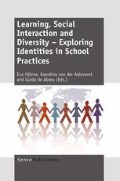Abstract
Parental involvement in children—s homework is strongly endorsed and encouraged by political and educational policy in the UK. However, involvement in mathematics homework is said to be particularly problematic for parents because of changes to the curriculum since their own schooling, the introduction of multitudinous mathematical strategies at school, and in the case of multicultural communities, an ever-increasing heterogeneity of learning experiences amongst parents. Using the theoretical framework of cultural models and cultural settings this chapter examines the kinds of resources parents use to make sense of their child—s mathematics homework.
Access this chapter
Tax calculation will be finalised at checkout
Purchases are for personal use only
Preview
Unable to display preview. Download preview PDF.
References
Abreu, G., de, & Cline, T. (2003). Schooled mathematics and cultural knowledge. Pedagogy, Culture and Society, 11(1), 11-30.
Abreu, G., de, Bishop, A., & Presmeg, N. (2002). Transitions between contexts of mathematical practices. Dordrecht: Kluwer.
Abreu, G., de (2008). From mathematics learning out-of-school to multicultural classrooms: A cultural psychological perspective. In L. English (Ed.), Handbooks of international research in mathematics education (pp. 352-383). USA: Lawrence Erlbaum Associates.
Andrews J, Yee WC (2006) Children's 'funds of knowledge' and their real life activities: Two minority ethnic children learning in out-of-school contexts in the UK. Educational Review 58(4):435–449
Bauchspies WK (2005) Sharing shoes and counting years: Mathematics, colonization, and communication. In: Chronaki A, Christiansen IM (eds) Challenging perspectives on mathematical classroom communication. Information Age Publishing, US, pp 237–259
Braun V, Clarke V (2006) Using thematic analysis in psychology. Qualitative Research in Psychology 3:77–101
Cooper H (1989) Synthesis of research on homework. Educational Readership 47:85–91
Crafter, S. (in press). Parental resources for understanding mathematical achievement in multiethnic settings. Paper presented at the 6th Conference of the European Society for Research in Mathematics Education (pp. 14-22). Lyon, France.
Crozier G (2000) Parents and schools: Partners or protagonists? Trentham Books, Staffordshire
Cullingford C, Morrison M (1999) Relationships between parents and schools: A case study. Educational Review 51(3):253–262
Department for Children, Schools and Families (2008). The Williams Report of the independent review of mathematical teaching in early years settings and primary schools. DCSF Publications.
Edwards R, Alldred P (2000) A typology of parental involvement in education centring on children and young people: Negotiating familiarisation, institutionalisation and individualisation. British Journal of the Sociology of Education 21(3):435–455
Edwards A, Warin J (1999) Parental involvement in raising the achievement of primary school pupils: why bother? Oxford Review of Education 25(3):325–342
Farrow S, Tymms P, Henderson B (1999) Homework and attainment in primary schools. British Educational Research Journal 25(3):323–342
Flick U, Fischer C, Neuber A, Wilhelm Schwartz F, Walter U (2003) Health in the context of growing old: Social representations of health. Journal of Health Psychology 8(5):539–556
Flick U (2000) Episodic interviewing. In: Bauer M, Gaskell G (eds) Qualitative researching with text, image and sound: A practical handbook. Sage Publications, UK, pp 75–92
Gallimore R, Goldenberg C (2001) Analysing cultural models and settings to connect minority achievement and school improvement research. Educational Psychologist 36(1):45–56
González N, Moll LC, Amanti C (2005) Funds of knowledge: Theorizing practices in households, communities, and classrooms. Lawrence Erlbaum Associates, New Jersey
Goodnow JJ (1990) The socialization of cognition: What's involved. In: Stigler JW, Shweder RS, Herdt G (eds) Cultural Psychology: Essays on comparative human development. Cambridge University Press, UK, pp 259–286
Hedegaard M (2005) Strategies for dealing with conflicts in value positions between home and school: influences on ethnic minority students' development of motives and identity. Culture & Psychology 11(2):87–205
Hughes M, Greenhough P (2007) 'We do it a different way at my school': Mathematics homework as a site for tension and conflict. In: Watson A, Winbourne P (eds) New directions for situated cognition in mathematics education (pp. 127-150). Springer
Lange T, Meaney T (2011) I actually started to scream: Emotional and mathematical trauma from doing school mathematics homework. Education Studies in Mathematics 77:35–51
McMullen, R., & Abreu, de. G. (2011). Mothers' experiences of their children's school mathematics at home: The impact of being a parent-teacher. Research in Mathematics Education, 13(1), 59-74.
O'Toole [now Crafter], S., & Abreu, G., de (2005). Parents' past experiences as resources for mediation in the child's current mathematical learning. European Journal of Psychology of Education, 20(1), 75-89.
Patall EA, Cooper H, Civey Robinson J (2008) Parental involvement in homework: A research synthesis. Review of Educational Research 78(4):1039–1101
Rogoff B (2003) The cultural nature of human development. OUP, Oxford
Sheldon SB, Epstein JL (2005) Involvement counts: Family and community partnerships and mathematics achievement. The Journal of Educational Research 98(4):196–206
Smith TJ (2003, September) Pedagogy as conversation: A metaphor for learning together. Mathematics Association of Victoria Annual Conference. Monash University, Melbourne
Solomon Y, Warin J, Lewis C (2002) Helping with homework? Homework as a site of tension for parents and teenagers. British Educational Research Journal 28(4):603–622
Street B, Baker D, Tomlin A (2008) Navigating numeracies: Home/school numeracy practices. Springer Science, UK
Swanson DM (2005) Schooled mathematics: discourse and the politics of context. In: Chronaki A, Christiansen IM (eds) Challenging perspectives on mathematics classroom communication. Information Age Publishing, US, pp 261–294
Warton PM (2001) The forgotten voices in homework: Views of students. Educational Psychologist 36(3):155–165
Zittoun T (2008) Learning through transitions: The role of instutions. European Journal of Psychology of Education 23(2):165–181
Author information
Authors and Affiliations
Editor information
Editors and Affiliations
Rights and permissions
Copyright information
© 2012 Sense Publishers
About this chapter
Cite this chapter
Crafter, S. (2012). Making Sense of Homework. In: Hjörne, E., Aalsvoort, G.v.d., Abreu, G.d. (eds) Learning, Social Interaction and Diversity – Exploring Identities in School Practices. SensePublishers, Rotterdam. https://doi.org/10.1007/978-94-6091-803-2_5
Download citation
DOI: https://doi.org/10.1007/978-94-6091-803-2_5
Publisher Name: SensePublishers, Rotterdam
Online ISBN: 978-94-6091-803-2
eBook Packages: Humanities, Social Sciences and LawEducation (R0)


